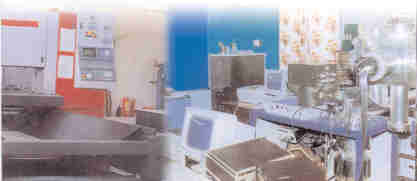BACK
SCIENCE
AND ENGINEERING RESEARCH COUNCIL
 |
The Science
and Engineering Research Council (SERC) was established in 1974 and is
an apex body through which the Department of Science and Technology (DST),
Govt. of India promotes R&D programmes in newly emerging and challenging
areas of science and engineering. SERC is composed of eminent scientists,
technologists drawn from various universities/national laboratories and
Industry. This Council is assisted by Programme Advisory Committees (PACs)
in various disciplines of Science & Engineering.
|
OBJECTIVES
OBJECTIVES
To
promote research in newly emerging and frontier areas of science and engineering
including multidisciplinary fields.
To selectively promote the
general research capability in relevant areas of science and engineering taking
into account capability of the host institutions.
To encourage young scientists
to take up challenging R&D activities.
To give special encouragement
to active scientists from relatively small and less endowed University Departments
and Institutions.
ACTIVITIES AND FUNCTIONS ACTIVITIES
Project
support to scientists and technologists in challenging areas
Unit
and core group around an outstanding scientist
Training
programmes involving young scientists
SERC Fellowships
Setting up of Research support facilities
Organisation
of Summer/Winter Schools
The mandate of research supported by the SERC includes increased
and expanded knowledge in basic research, excellence in science & engineering,
innovation and promotion of selected areas, encouragement for industrial partnership in
projects under engineering and technology, training of manpower and encouragement to young
scientists and students on a selective basis. It also acts as a mechanism for inter-agency
coordination with other S&T agencies for better management of R&D funding through
joint/complimentary funding in major projects.
SERC funds R&D Programmes in identified areas to
Scientists and Technologists who are working in the academic sector, National labs and
other recognised institutions.
SERC activities may be classified under the
following broad disciplines:
Chemical
Science
Earth
& Atmospheric Science
Engineering
Science
Life
Science
Mathematical
Science
Physical
Science
SERC, had earlier identified
specific areas of research known as Thrust areas through the
mechanism of organising a series of national workshops in most of the above
disciplines. More recently, the Programme Advisory Committees of the SERC had
deliberated on updating these thrust areas and identifying new and challenging
research areas for support in the future. Few examples of the broad areas identified
by the SERC are Molecular Biophysics, Chronobiology , plant animal relationships,
Communicable and non-communicable diseases, small permanent magnet machines,
smart sensors, optical communication, hydrogen as substitute for hydrocarbons, ground water recharging, watershed management, high precision
manufacturing, design of VLSI circuits, integrated manufacturing, synthesis
and structure of complex molecules, organometallic and cluster chemistry , ultra
fast reaction dynamics, combinatorial chemistry, corrosion etc., quantum optics
and basic laser physics, non-linear optics, physics of biological systems, evolution
of Indian crust, study of earthquake processes, climate observation and modelling,
severe weather system, stochastic process modelling, combinatorial optimisation,
game theory , etc.
"Vision for R&D" documents in various disciplines are available
on request.
SERC FUNDING PROVIDES GRANTS TOWARDS
(I) Equipment, scientific & research manpower, Supplies & consumables,
contigencies and travel under the project mode support, and other special requirements.
The Universities/Institutions, located in remote
places, can send specific request on Orientation on SERC & DST funding to enable the
DST staff members to visit the concerned institutions.
Scientist and technologists who are associated with SERC Projects are also provided
guidance on issues related to Intellectual Property Rights (IPR) and Patenting through the
Patent Facilitating Cell (PFC) in the DST.
OTHER INFORMATION
(I) The project proposals for consideration under the SERC Scheme can be submitted anytime
throughout the year.
(II) The Investigators may submit only 20 copies of the proposal printed on both the sides
of A4 size paper along with the electronic copy of the proposal on a 1.44 MB floppy,
preferablly in MS Word.
For more information please contact:
Shri V Rao
Aiyagari
Member-Secretary (SERC)
Department of Science & Technology, Technology Bhawan,
New Mehrauli Road,
New Delhi-110 016
Telefax: 011-6963695
E-mail:
[email protected]
[email protected]
